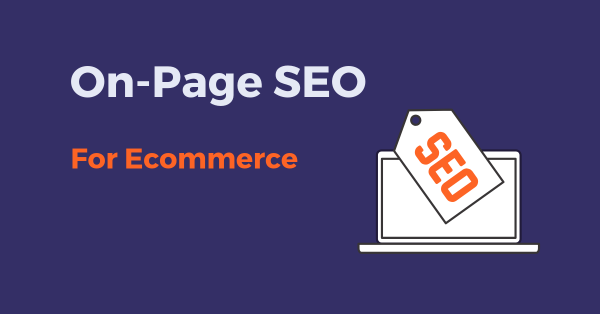Table of Contents
- Ecommerce Website Keyword Research
- On-page Optimization for Ecommerce Website
- Ecommerce Website Content Marketing
- Building Backlinks for Ecommerce Website
- Social Media for Ecommerce SEO
- Analytics and Monitoring for Ecommerce SEO
Ecommerce Website Keyword Research
Ecommerce Website Keyword Research is the process of finding keywords that your customers will use when searching for products on your website. This helps you optimize your ecommerce content for search engines and creates relevant, engaging web pages that resonate with your target audience.
How to Do Keyword Research?
The first step in any keyword research process is to find the right keywords. This can be done by using various tools. These tools can help you generate a list of potential keywords that are relevant to your eCommerce business.
Identify Head Keywords and Long Tail keywords
The next step in the keyword research process is to identify the head keywords that you want your ecommerce site to rank for. These can be simple two-word phrases or long-tail keywords with three to five words, depending on the niche of your ecommerce store.
You’ll want to use these keywords in your title tags, meta descriptions and URLs to help Google understand what the page is about. It is also a good idea to use these keywords in the content of your product pages, category pages and blog posts to further enhance your site’s SEO.
When it comes to selecting keywords, you can’t go wrong with long-tail keywords. These are more specific and easier to rank for than short-tail keywords. They also tend to convert better as they catch people further along in the buying cycle.

On-Page Optimization for eCommerce Website
The first thing any ecommerce business needs to do is optimize their website for search engines. This will increase their visibility and drive more traffic to their site.
Blogging is great way to boost your eCommerce site’s search ranking and it should be done regularly. Blog posts that answer your customers’ questions and use on-page SEO tactics like readable URLs, correct meta tags, and long-tail keywords boost your SERPs and build brand credibility.
Question and answer content focused on products is a big opportunity for eCommerce websites. It solves the problem of getting unique content onto product pages on scale and it allows retailers to get user generated content into lots of their product pages without a lot of effort.
Internal Linking is also a key part of ecommerce SEO and can help your pages rank higher in search results. This involves linking relevant content on your website to each other, which helps Google understand which pages are the most important and will boost your rankings for related searches.
Category Pages are a crucial part of your ecommerce website and they need to be optimized to increase their search visibility. They should have a unique title tag, meta description and image alternate attributes.

Ecommerce Website Content Marketing
Ecommerce Website Content Marketing is a type of marketing where you publish blog posts, articles and other content to promote your brand. It can be a great way to increase visibility, generate leads, boost sales and create brand recognition.
A successful ecommerce content strategy takes the audience from awareness to consideration and then into your sales funnel by providing relevant, valuable, and compelling information to make their shopping decisions easier. To do this, you need to identify your target audience and understand their needs and wants.
Using a Keyword Planner
When you use a keyword planner tool, you can get content ideas based on the primary and secondary keywords that your target audience is searching for. This will help you get more out of each piece of content you write and will also make sure that your ecommerce website is optimized for search engines.
Best of Lists
Creating “best of” lists is another way to improve your rankings for searches that include a specific product or category. For example, if Tom’s T-shirt company sells a line of T-shirts for the summer, creating a “best of” T-shirt article will help your website rank for that search term.

Building Backlinks for Ecommerce Website
It’s no secret that ecommerce sales are expected to grow exponentially over the next few years. This means that a strong backlink profile is crucial for ecommerce store owners to rank highly in search results.
The right kind of links can make the difference between your ecommerce website generating a steady stream of organic traffic and ranking poorly. Whether you’re targeting a small or large niche, there are a variety of ways to get quality backlinks to your site.
Identifying the types of quality backlinks you need to build is important for getting started in link building. There are three major categories of links: a) High Authority; b) Grey Hat; and c) Black Hat.
A High Authority Link is from an authoritative domain that earns a lot of trust (from people, referring domains, and Google) and has a wide variety of quality backlinks.
As a result, a high authority link will have a much stronger impact on your rankings than a low-quality link from an unreliable or spammy website.

Social Media for E-Commerce SEO – Best Practices & Tools
With the increasing number of online-only retailers, the e-commerce industry is booming. This is great news for both consumers and marketers alike, as more options and convenience are available to customers than ever before. But it can also be a challenge for ecommerce marketers trying to compete.
Using social media marketing strategies can help you reach your target audience, increase brand awareness and drive qualified traffic to your e-commerce site. In addition, it can also improve your SEO rankings and help you get more organic leads and sales.
Content Strategy
Creating quality, unique content for your e-commerce website is key to improving your search engine optimization (SEO) rankings and driving traffic to your site. Having a clear content strategy in place can help your e-commerce business stand out from the competition.
User-generated content
With the rise of user-generated content, businesses can connect with their audiences on a more personal level than traditional e-commerce strategies can allow. This can result in increased customer engagement, higher conversions and a better overall experience for users.
Response Management
Having a dedicated team to manage social media accounts can help ensure that comments are responded to quickly and effectively. This is especially important when your e-commerce business operates around the clock.

Analytics and Monitoring for E-Commerce SEO
A key element of any e-commerce strategy is the ability to track and monitor the success of your online store. This is best done with a analytics tool that offers accurate, reliable data.
Traditional website analysis tests a site’s performance against common metrics such as traffic, time on page, and top content. This helps you identify areas of your e-commerce site that need work and improves the overall experience of visitors.
Conversion Rates and Bounce Rates
A successful e-commerce business depends on customer conversions, so you want to make sure that your site is optimized to convert as many visitors as possible into sales. One way to do this is by tracking your conversion rate, which is the percentage of visitors who click on a particular link and convert to a sale.
Another important metric is your bounce rate, which is the percentage of visitors who enter your site and leave it without clicking on a link or making a purchase. A high bounce rate can deter users from your website and impact your search engine rankings, so it’s important to keep it low.
Lastly, you want to monitor your revenue, which is the amount of money that your website generates from purchases made by visitors. This enables you to compare sales trends and understand how your e-commerce strategy is affecting your bottom line.











